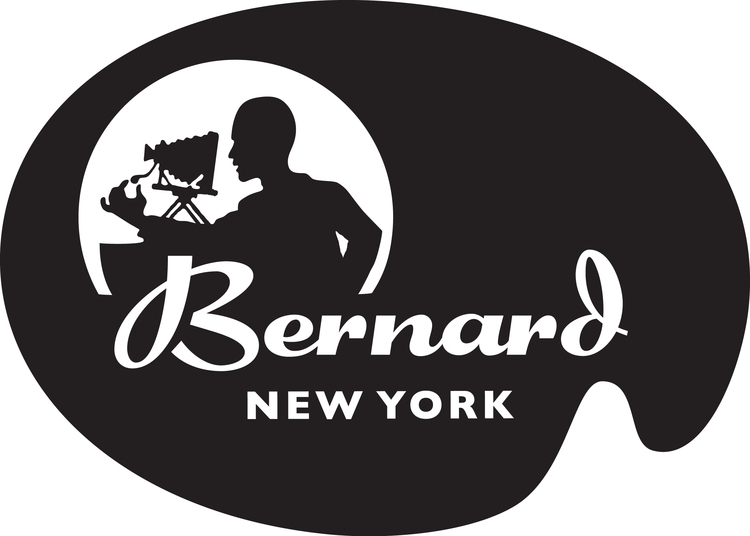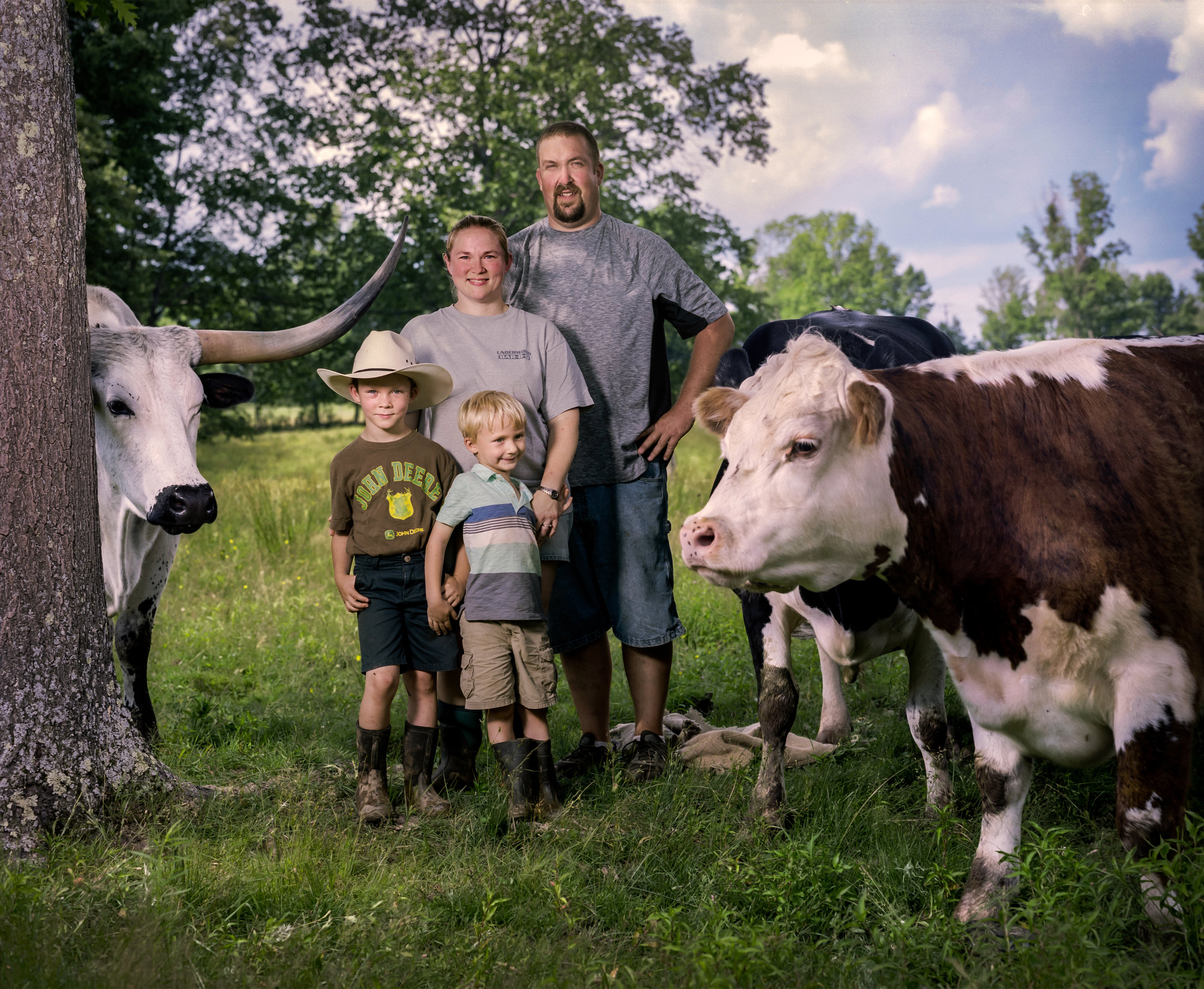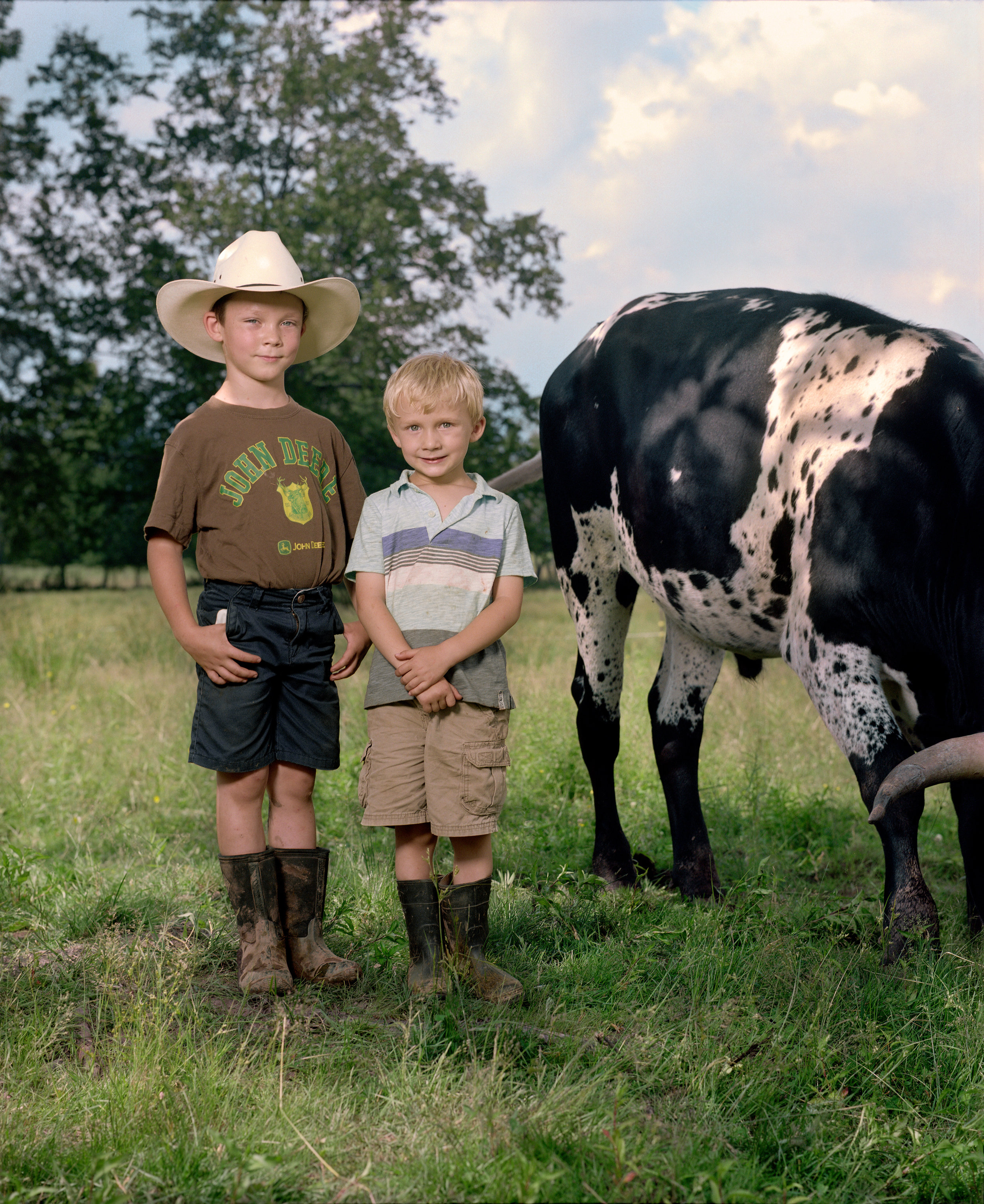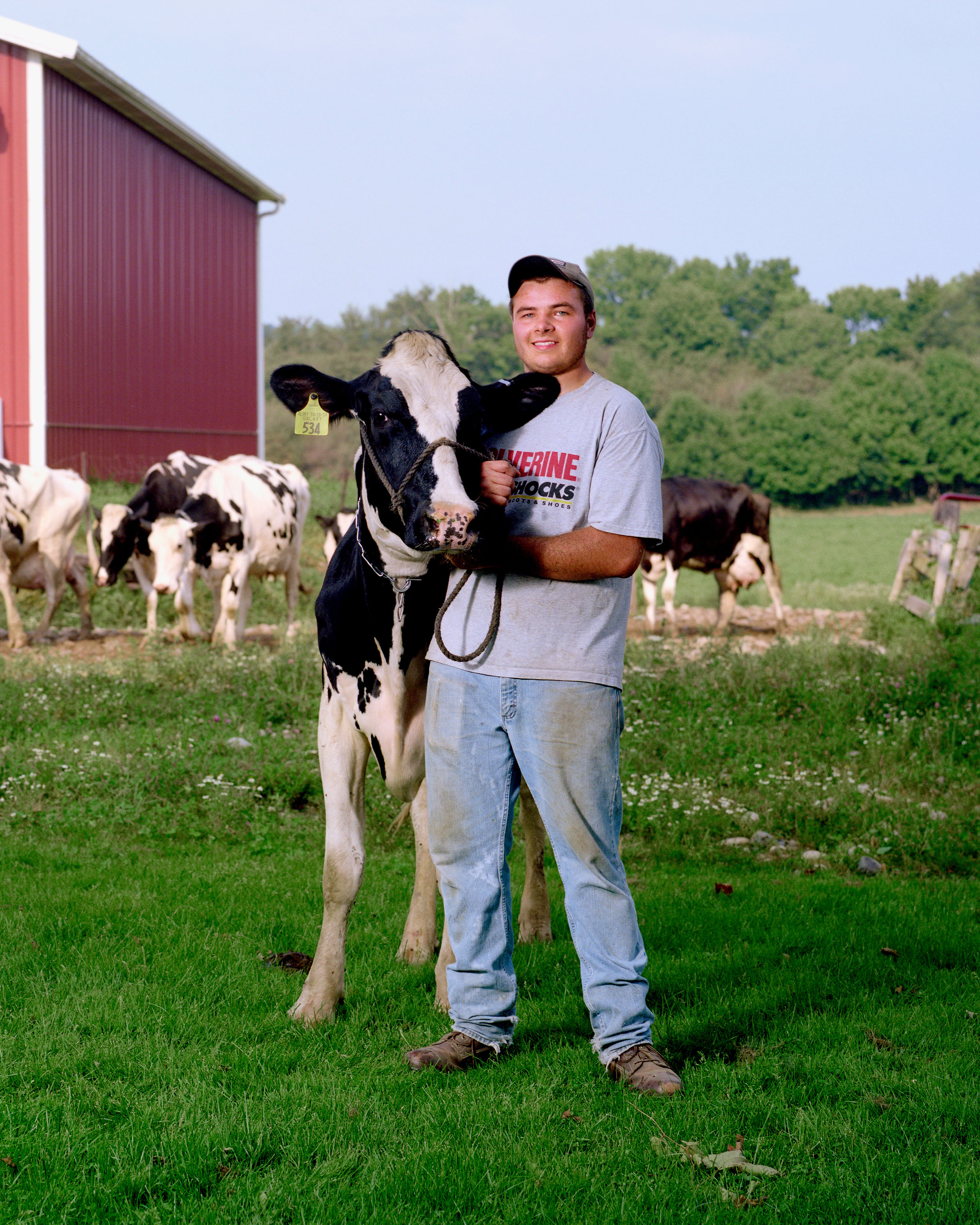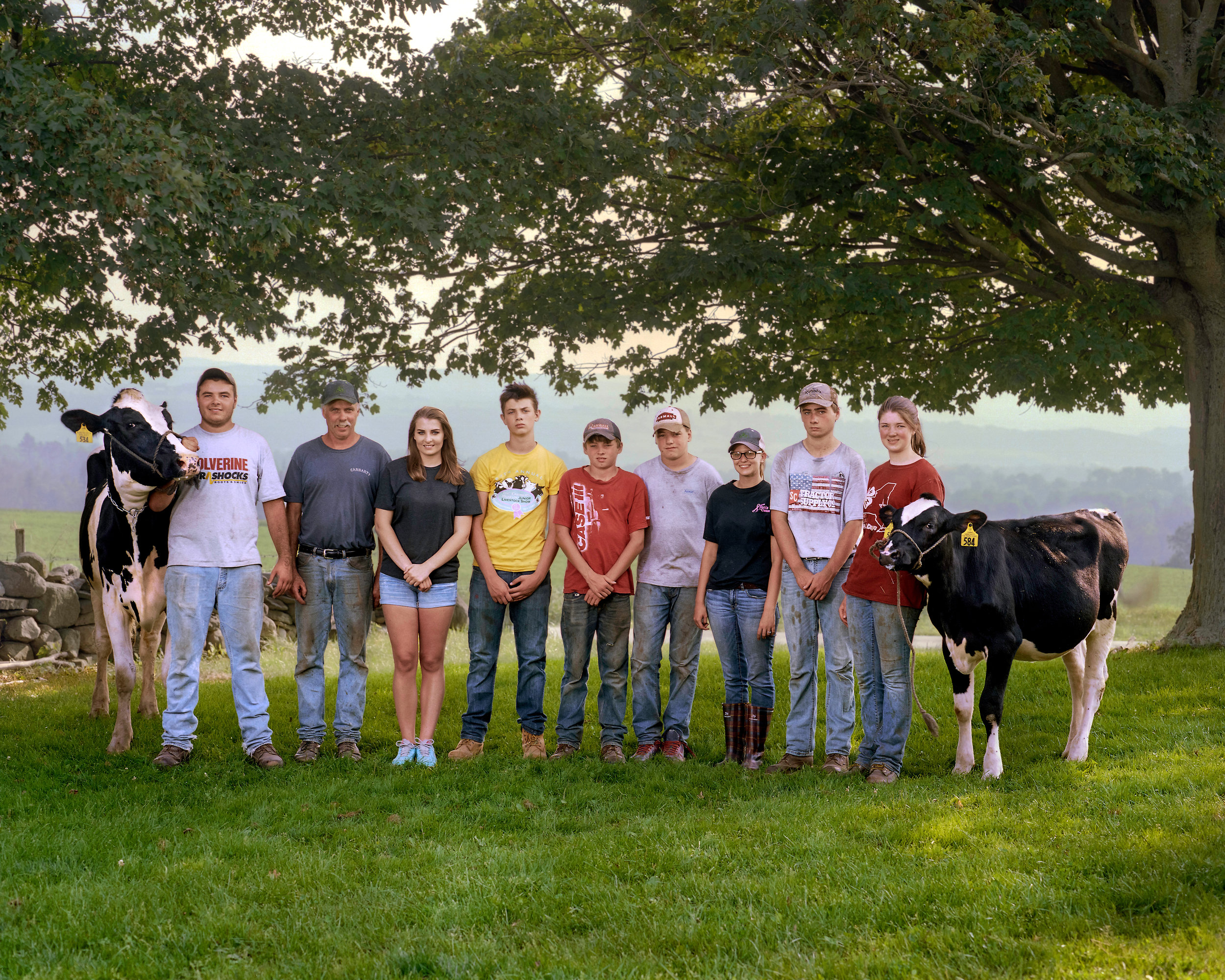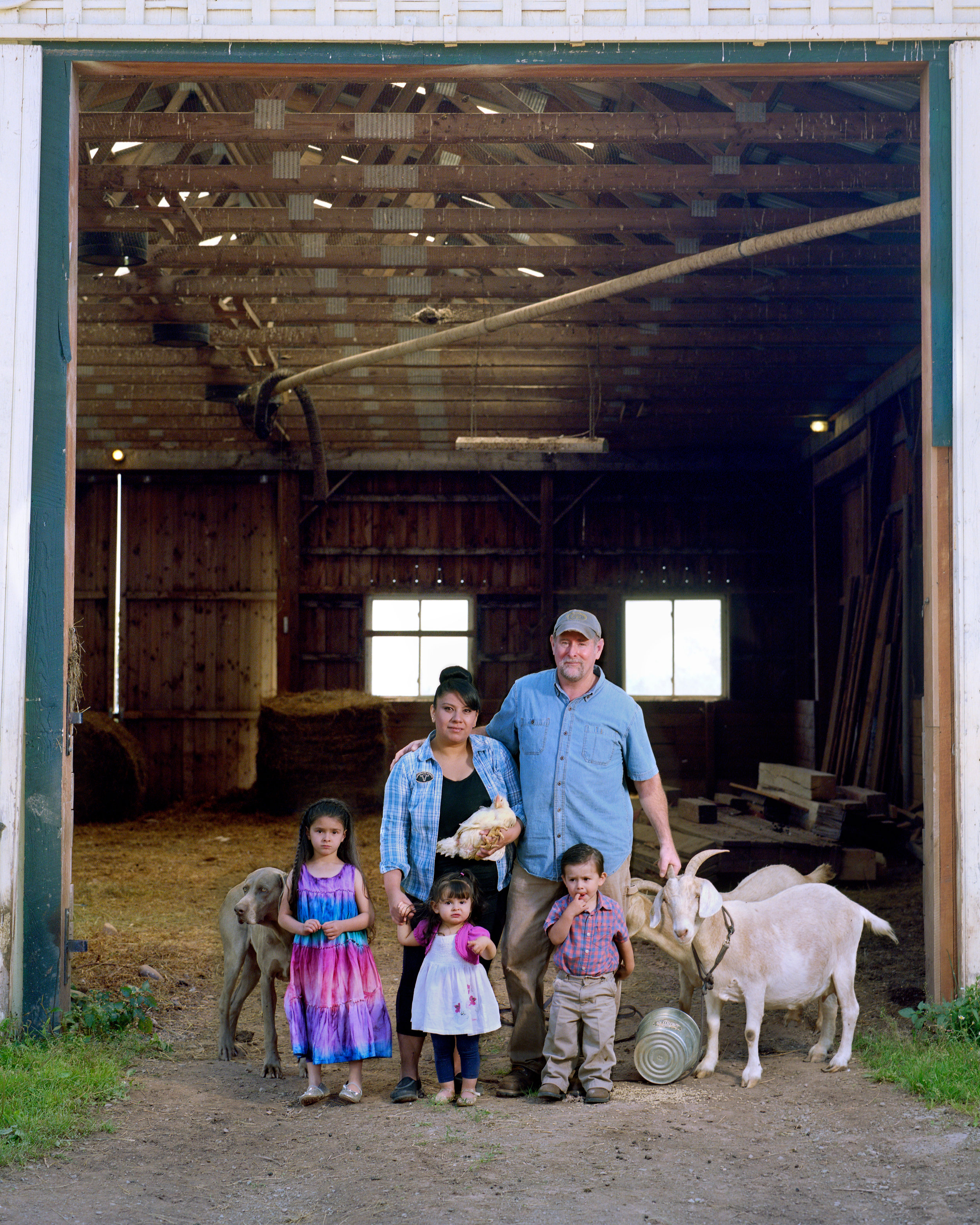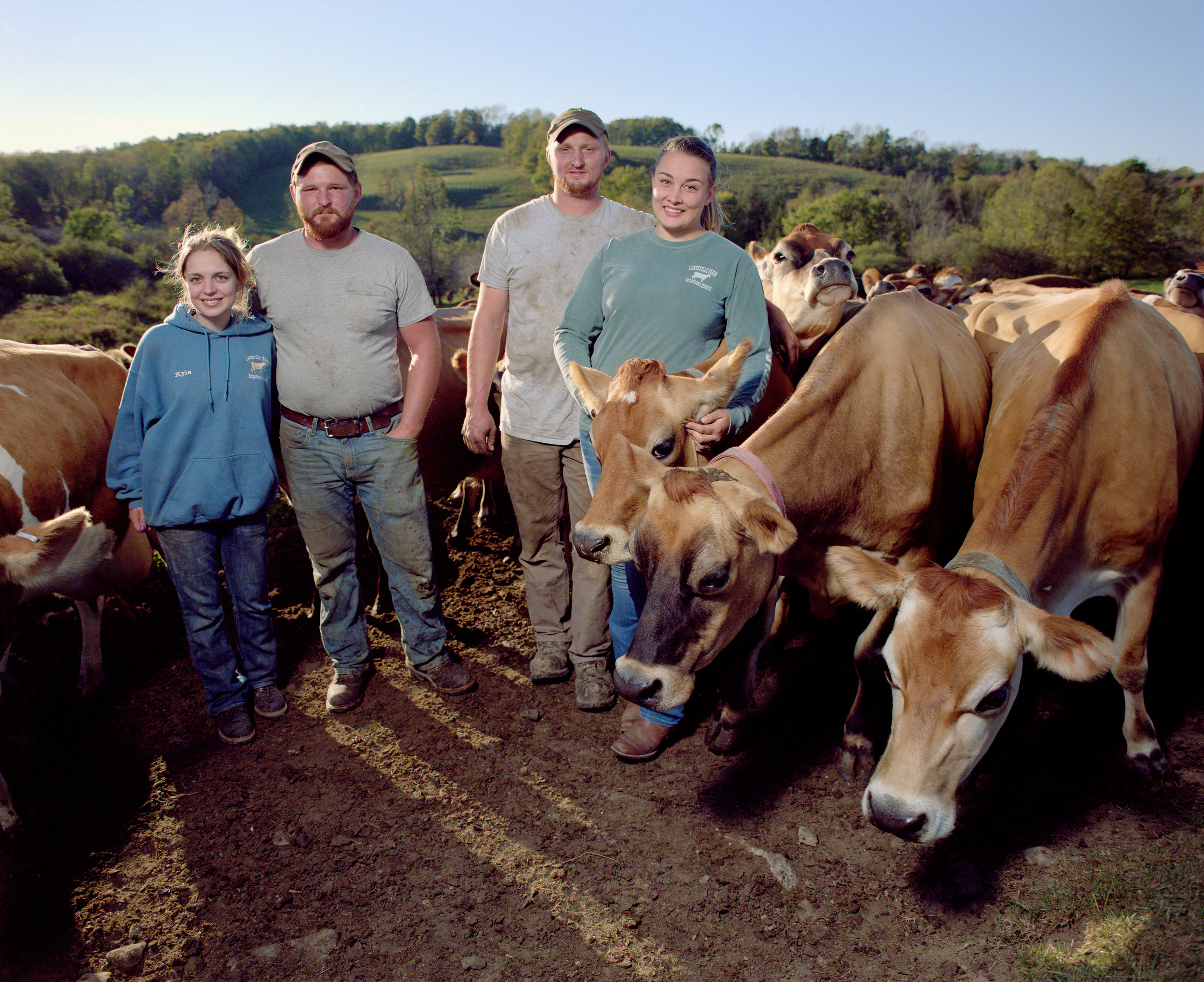To Grow a Farmer
My goal with this project is to show an aspect of contemporary farming in upstate New York and specifically the vital, hard working, creative, and proud farmers in and around the Oneonta area. This is a series of portraits of legacy farmers who have found innovative ways of surviving in this economic climate along with families or individuals who have managed in unique ways to start and sustain new farms. These are people who are continuing the agricultural tradition of farming while producing meaningful, mindful, and healthy ways to provide food for the community at large.
If we do not eat we die. In our contemporary society we have a division of labor, and so we rely on the farmer to produce what we consume. Yet all over New York state abandoned and crumbling farms seem to abound. The statistics for farming are shocking: for every five farmers who leave the profession only one is coming in to replace them. Farming is hard work. Large Agri-Businesses emphasize profit over quality of product and often over quality of life. And we as a country often choose to eat the junk food they produce. These portraits show the families who, for the benefit of all, are choosing to stay on the family farm or who have begun the arduous task of building a new one to grow clean, healthy, sustainable food for us all.
My personal work has always centered on the relationship of human beings to our environment. I am interested in how we cultivate and shape the land in order to survive. To photograph the farmers in the region where I live and work is a natural continuation of this theme.
Taken outside yet using studio lighting, the inspiration for the style of these portraits comes from the life size dioramas in the American Museum of Natural History. These dioramas were first displayed in 1889 the year of the founding of Oneonta and the year of the invention of the modern roll film.
I recorded this project on color negative film using a mechanical medium format camera that was manufactured during the 1970’s. The film is Kodak Color Negative film. Color film is an 81-year-old process and tradition that, much like farming, has stood the test of time. The film I am using is a locally produced product from Eastman Kodak in Rochester, New York. Photographic film uses gelatin which is a farm produced substance made from hide and bone. All test shots were done using Fujifilm FP-100C Instant Color Film, to check exposure and composition. ( I am grateful that this is still being made)
The film is then scanned, digitally recorded, and then printed using an Archival Pigment Ink Jet process. There is not "photoshop" tricks to these photos, whatever happened in the frame just happened. Nothing was added or taken away in the photograph.
I hope I have illuminated for you the current and innovative techniques used on start up and legacy farms by farmers who are not only surviving in the agricultural community but also sustaining us all.
-Wesley Bernard
Farm Stories in their own words
Underwood Ranch, Unadilla, NY
We sell direct to buyer beef by the quarter usually 1 steer/year, some eggs, and honey (131lbs this year) and bees wax products like lip balm, hand cream, lotion bars, and handmade soaps.
I enjoy animals, they are like my pets. Cows are friendly. I would love to do dairy, but my husband and I both have full time jobs, so not enough time. I love the versatility of bees, the honey is natural, and there are many products that can be made from the wax, and I want to help pollination in the area.
I bought my property in 2005 when I moved here from Allentown, PA to start my medical career. Initially I had 10 acres and bought a day old calf from the Chambers auction in Unadilla, NY. I also bought a horse and some chickens. Then I met my husband who enjoys building and fixing things. We wanted to get into a breed of beef cows which were unique to our area, and I fell in love with a few different ones, but my husbands’ uncle was dispersing his herd of Texas Longhorns. I was attracted to them because of their color and variability. They are docile animals, leaner meat, and have variability in horn length and color pattern. We also have a donkey, purchased another 15 acres adjoining our land, for a total of 25 acres, and 2 years ago we added bees to our ranch, which has been a huge learning curve, very interesting insects.
I farm because I love animals. I came from the city and always wanted a farm with animals growing up near the Amish. My mother always told me, “when you grow up and move out, you can have as many animals as you want.” And that’s what I did. I want to know what is in my food, no additives or antibiotics. I want natural food products. And I want to preserve our farms. Too much farm land has been lost to housing development and I feel it is important to preserve as much farmland as possible. It is also a healthy lifestyle. With how technological our society has become, it is something to do that involves some labor and being outside.
I hope my boys will have animals or some type of a farm as they grow up. I feel it is important for them to learn what manual labor is like, and its great they can see results of their hard work. I want them to have survival skills/ not rely so much on society for things, and this is a step towards that.
-Angelika Underwood
Reed Maple Farm, Hamden, New York
My father took over the Farm from his father and milked cows until 1986. In 1991, I built the sugar house and started producing maple syrup. In 1992, my father started beef farming.
Being born and raised on a farm becomes a part of you. To work on the land with family and see it produce is very gratifying. I enjoy farming and think we need to preserve this one self sufficient way of life in this country!
I would like my children/grandchildren to continue if they enjoy it. I want to see the farm be productive and be a place for their children to grow up with. I don’t feel that many children have the opportunity to be as close to their parents as we do on the farm.
My grandfather produced maple syrup in the 50’s and it was something I always wanted to do. I started at the “hobby” level in high school and was hooked from then on. Maple season is also a time of year that is slow on the farm, and it does not interfere with other crops.
-Jody Reed
Berry Brook Farm, Delancey, NY
We produce 6 acres of certified organic vegetables and we grow vegetables because it's what we love to do.After farming separately, in 2013 we teamed up, got married, made a baby, and plowed the fields of our farm in Delancey, NY. We love what we do, we're proud to farm in the Catskills, and we are working hard to feed more and more people each season.
We farm because it's what we love to do. We also love growing food for our community, providing meaningful employment, for our neighbors, and it turns out to be a great way to raise kids.
- Eleanor Blakeslee
Root ‘N Roost Farm, White Sulphur Springs, NY
We produce small scale quantities of produce, herbs, flowers, fruits, honey, maple syrup, jams/jellies, chicken, duck, turkey, and pork, as well as sell live animals, teach classes, give tours of our farm, and offer consulting services to our community such as helping summer camps manage their gardens and build gardens, e
We designed our farm to be a permanent homestead with the goals of 1) producing as much of our own food as we can, 2) producing above and beyond our first goal so as to sell that produce to our community, off the farm directly, only, and 3)to engage our community by having them come to our farm for purchasing, classes, and tours so that farming is allowed to re-enter our conscious as a society. We do not farm strictly, or even primarily, for profit. It is a lifestyle in which profit may, or may not, play a role in our goals and plans each year. Ultimately, it pays the taxes and it’s expenses, and hopefully draws income in the first 10 years (We’re coming into year 7).
Sean moved back home to help his mother with health issues and the agreement made included turning his childhood home and property into a homestead and farm with the goals of developing a permaculture education farm. He soon met Cheyenne, who was interning at a neighboring farm, and the two began brainstorming a farm together on Sean’s land. A year later, after much hard work, trials and tribulations, Root ‘N Roost Farm opened in May of 2012 with a farm stand, CSA, over 100 animals, 7 bee hives, and a wide variety of produce products to purchase, as well as classes and tours to engage in. We instituted a 3-month internship program, and also accept WWOOFers (volunteers), and turn our farm into a community-on-farm each year, hosting upwards of 25 people each year. We are entering our 7th year farming, and 6th in business on this land.
We eat food. Our world’s food system has major problems. The “food” being sold in stores is questionable in most circumstances, suspect in others, and toxic in many instances. After personal health related situations in my life, I decided I agreed with Hippocrates. Let me food be my medicine.
We live on Earth. Our world’s planetary systems have major problems. The “food” being sold in stores is unquestionably a part of those problems with agricultural runoff, soil erosion, and the ridiculous amounts of toxins that are released into our soil, ail, and water each year to “feed the world.” Small scale farming is as much about personal health as it is about planetary health, and everything in between. We farm without fossil fuels (no tractor, no tiller), we don’t use chemicals of any kind, and we aim to leave the land healthier than before with polyculture systems that benefit our environment year after year with minimal inputs, and minimum disturbance to the environment.
We all need farms. Our world’s population, unfortunately at this moment in time, is NOT decreasing. More food, in often, ingenious ways, needs to be produced, and I’ll add that it needs to be produced in ways that benefit our world, not detract from it as we have been doing since WWI. Our child is 19 months old and he has already benefited from our farm and farm lifestyle in so many positive ways. He will ultimately have to decide if farming is “right” for him (and any other children we have) but between now and then, it will be a part of his life, daily chores, fun activities, learning new things in nature, and all that that entails. Every child should have exposure to farming and nature.
-Cheyenne Rose Zigmund
Hollywood Enterprises / Roedale Farm, Richfield Springs, NY
For Roedale farm the major percentage of income is from the sale of fluid milk. Sales of crops-hay, straw, corn and small grains are a smaller but growing percentage of our sales. We sold a total of 2.75 million pounds of milk in 2017. Our Hollywood enterprises focus is totally on production and sales of turkey- both fresh for thanksgiving and parts available through out the year. In 2017 we sold 160 turkeys as whole birds and marketed legs, wings, breasts, thighs, form 30 additional birds.
Turkeys were once a 4-h project and now we continue to develop this market as the public has continued to call for more locally produced food. We will continue to grow this side of the farming business.
Our farm was started in 1950 by Jason’s grandparents, Russell and Betty in New Jersey, and relocated to New York in 1972. We now have a total of 850 acres and 275 head of Holstein cattle. The LLC is currently a partnership with Jason, his brother and their parents. Hollywood enterprises was started in 2006 when Jason and Holly raised their first group of turkeys together. However, I have been raising birds since 1989, throughout high school and college.
We feel that producing food for the world is our calling in life. There is nothing more exciting than delivering a new born calf and watching her develop into a profitable member of the herd, or watching our children learn about equipment and farming by working with us on a daily basis. These things are important because we can teach our children about life and death, financial management and the importance of setting goals and working towards them on a daily basis.
First and foremost we realize that farming is a fickle business and way of life which may not always be well suited for everyone. With that in mind we have always told our children that they need to do what makes them happy in life. If they want to farm we will do our best to support that dream, even if they choose not to farm with us. If they want to pursue other areas of interest in life then will support that as well.
-Holly Pullis
Rock-View Farm, Saint Johnsville, NY
On our farm our main product is milk. We produce around 5,000 pounds of milk a day. The milk is picked up every day and sold to Dairy Farmers of America. We also grow corn and hay to feed the herd throughout the year. We produce around 20,000 square bales. As another source of income for the farm, any excess hay is sold to large horse farms in Westchester County.
Geographically, the area is a good environment for the dairy cows. The land is steep-sloped with plenty of rocks, which would not be ideal for vegetable farming, etc. Most of the farms in the valley produce milk, which is then sold to dairy handlers here in the Northeast.
Jacob R. Feagles farmed in Pine Island, Town of Warwick, Orange Co., NY, a few miles from the NJ border. He was a founder of the Dairymen’s League in 1907. Jacob and Emma Feagles had 5 children: two girls and three boys. Boys Jacob, George and Henry Barney, all went farming in the area raising families of their own. Of Jacob’s three boys, only Barney’s son, Robert, had an interest in farming. Robert followed his dad around and began working with him at an early age. After attending Cornell, Robert returned to the farm and went into partnership with his father. Robert married and had 4 children, Gail, Robert Jr., David and Judy. Because the farm was only 50 miles from the George Washington Bridge, New York City began to move north. Investors saw the opportunity to purchase land in the Town of Warwick. Robert had the opportunity to purchase the farm but chose not to. In 1968, Robert and Joan began looking for farms upstate. On April 19, 1972, the family moved to their current location on Kennedy Rd., in the Town of St. Johnsville, formerly owned by James Christman. Today, Rock-View Farm is operated by Robert Sr., Robert Jr., and David, with the next generation of Feagles taking an active part in the operation.
We’ve been farming for at least five generations. It’s what we’ve always done, and we enjoy producing milk, and working with the animals. Farming is important in order to feed America, whether it be milk, vegetables, meat, etc. Small family farms are important in producing a variety of commodities for the local consumer to enjoy, whether it’s sold at a farm stand, or purchased at the grocery store.
Being that I’m only 18 years old, I haven’t thought a lot about children. If I have children in the future, I would of course like to see them grow up on the farm and fall in love with it like I did. Although, with today’s economic challenges and changing regulations, it is more difficult to make a profit and live a comfortable life.
-Jacob Feagles
Beaverkill Trout Hatchery, Livingston, Manor, NY
We produce trout, about 250,000, from eggs to fish, over 20 inches long and we must continue the work in progress layed out by our forefathers. I believe they were visionaries, how could they know they were on the right track for a successful farming operation that generations to follow could continue and be successful at, and be in demand.
The Beaverkill Trout Hatchery was spawned in 1963 by the late Fred D. Shaver, a dairy farmer and avid sportsmen. In 1965 he was partnered with his son the late Edwin D. Shaver and his grandson the late Gary D. Shaver. Gary’s wife, the late Betty Shaver was also very instrumental in helping and later owning and operating the Hatchery with her daughter Sherry upon Gary’s sudden death in 2009.
Owner/operator Sherry Shaver is quite proud in working with family members Frankie Shaver,4th generation, Gary Tyler Shaver ,5th generation. Chris Shaver,5th generation, Ashlynne Ratner,5th generation. and family friend Mike Logothety.
Rounding out the team are Rube Smith, cousin. Terri Shaver Lockhart, cousin and family friend Carol Backman.
We are perhaps the oldest and largest private Trout Hatchery in New York state, primarily stocking live trout to customers in NY, NJ, PA and CONN. Beaverkill Trout can be found at the finer restaurants in the Catskills and Vicinity. A Fish and Pay Pond/roadside stand are on the premises, open weekends April-Labor day.
We are following in the footsteps of our forefathers. It’s a matter of pride and hardwork. Knowing our trout will soon be the cleanest fish for people to consume and enjoy catching, it is our life. I believe there will always be a demand for our services and product.
-Sherry Shaver
Greenane Farms, Meridale, NY
Rider Family
We Raise :
Grass-Fed Angus Beef (300 head)
Pastured Chicken (10,000+ per year)
Quail (10,000+ per year)
Pastured Heritage Pork (300 head per year)
Meat Goats (50+ per year)
Sheep (just a few)
Vegetables
Raspberries
Seasonal farm-to-table Restaurant serving Authentic Mexican Cuisine
Farm Store & butcher shop
We are primarily a livestock farm raising pastured animals. We believe that returning animals to pasture is the most natural and humane way of raising animals and it provides the most natural, safe, and health meats possible.
We began construction of the farm in the Fall of 2003 on 100 acres of undeveloped land. After a lot of hard-work we had built barns, workshops, living quarters, and installed a lot of fence and accommodations for the animals. We have been working and growing ever since. After wrapping up careers in international business and traveling the world Thanya & Patrick retreated to the farm with other family members to dedicate ourselves to growing our family, raising children, and full-time farming which generates 100% of our income.
We are a diversified family farm that began farming as a way to provide safe, wholesome food for our family. Over the years and out of necessity to support our growing family the farm has grown as well. The on-farm restaurant and farm store grew out of a desire to share both the healthy and wholesome food we produce with as many people as possible.
We would like to think our children will continue with farming and the development of the family business. Much our diversification efforts are aimed at keeping all our family members engaged, very interested and committed to the family business and its various enterprises. We trust that in time social awareness about the true cost of safe and natural food will grow and will allow all our family members involved with the farm to work hard and earn enough to live with dignity.
-Patrick Rider
Homegrown Farmstead, Delhi, NY
We produce Pork, Goat, Lamb, Beef, Eggs, Blueberries, Raspberry, Blackberry, Apples, Kale and other greens.
We produce what we like to eat and the farmstead is two years old.
We farm because of the self sufficiency, and we are contributing and connecting to the local community, all natural chemical free eating, avoiding factory farming, caring for animals, a good excuse to work outside, escape from city life, and its fun and rewarding!
-Nicole Gillikin
God’s Little Acres Legacy Farm, Otego, NY
We produce beef cows and chicken eggs at this point, and we are looking to move into meat goats this year. We average 5 to 7 beef cows per year for product.
We average from 5 to 15 dozen eggs a week from the chickens.
We chose to produce chickens because I have had a love of chickens all my life that goes back for generations. My grandmother raised chickens for meat and eggs. The story goes that she was feeding her hens cracked corn, and when she flung the corn, she flung her diamond ring, which they never did find. Ever since that day, I always thought that chickens were precious gems.
We raise beef cows because we want to know where our food comes from, because you truly don’t in the grocery store.
We each come from farming families from generations back. We both have been farming in some way since we were 5 years old. We have officially owned our own farm for about 10 months now. The name of our farm comes from my Grandfather’s former farm “Gods Little Acres,” which we lost to a fire in 2015.
Farming is hobby for some or a profession for others, but it is a way of life for us. From when you get up in the morning to when you go to bed at night, it is a vision that you have for your life, and for the world. Farming means that you know what your food is, and where it comes from. Farming is a community of people who work together, dedicated to the growth and advancement of good animals and good products. It is a commitment that you have every day, whether it is sunny and warm outside, or there is a blizzard and you have to carry out your duties. To us, farming is the future that we want for our family.
If we have children, we definitely want them to continue to have an appreciation for farming and animals, and our way of life. Whatever their choice, the lessons that they will learn growing up on a farm will be unmatched.
- Dayle and Dennis Allen
Good Fields Farm/The Maiden's Creamery, South New Berlin, NY
The farm production is Aged raw milk Goat cheese. The annual production of cheese is about 2500lbs.
The hill top land where the farm is located is most productive growing browse forages which the goats thrive on. Because the goats are small ruminates the infrastructure necessary to milk goats and produce cheese is also small and affordable to build. I also enjoy being outside and close to Nature.
The farm was started in 1998 with the purchase of 5 week old dairy heifers. The farm became certified organic in 1999 and has been organic ever since. Various farm enterprises were tried out for profitability and in 2008 I settled on a farm enterprise producing cheese with goat milk. It took 6 years to develop the business plan, a cheese recipe, and build the barn and creamery.
This season is the 4th year of permitted cheese production.
Developing a farm enterprise which is low input, economically sustainable and focused on producing high quality food is a positive counterbalance to the industrial food production system which exists today.
-Mark Harvey
Lentsville Farm, Cherry Valley, NY
We are a Milk producer, about 2000 lb/day
We choose to milk cows because its what we grew up doing. Our family has been in the dairy industry for 5 generations. We grew up raising Jersey cows; we know each cow by name and attitude. We love our Lentsville girls. We continue to milk cows simply because we love it.
My father grew up on a farm close by with his parents and two brothers. We first bought my father a calf for his birthday in 1995, starting our herd. We continued to buy animals, as they grew we began renting a milking facility nearby. Our first load of milk was shipped in 1996 to Agri-Mark. After a few years we realized how much we liked Jersey cows and decided to have a herd of only registered Jerseys. Today every animal we own has been bred, born, and raised on our farm. We continue to ship our milk to Agri-Mark to this day. It has been 22 years since we shipped our first load of milk, not only has our heard grown, but so has our family. When we began milking, most chores including milking was done by our parents. Although our parents are still on the farm, we do most of the day to day activities on the farm.
We farm because we love it. Farming becomes a part of you after a while. We watch our girls(cows) grow from the day they are born until their last day. Many big farm’s cattle have an average lifespan of 5 years. On our family owned farm our average age is 9. The oldest cow we have had was 19, her name was Mikey. Being a small family owned farm we take pride in each of our animals and couldn’t imagine our lives without them in it. Although it is a lot of work not just doing chores twice a day, but also doing the field work and paper work, in the end it is worth it to us. Dairy farming is important for various reasons. We help feed the world. Our milk is made into cheese, butter, ice cream, etc.. Who doesn’t like ice cream? To our family it has taught us a unique work ethic, a different kind of morals, and a very strong set of values that is getting to be less common in the world today.
We hope our children enjoy the farm as much as we do. We are excited to raise our families on an operating dairy just how we were raised. Kids raised around farms tend to have a good work ethic and a deeper appreciation for hard work and reward. There are character traits common to farm kids that are difficult to find anywhere else. We would be happy to see our future children continue to farm as long as it is what they want. Hopefully if they decide to farm it has become at least slightly profitable to operate a small farm unlike it is now.
- Kraham Family
Danforth Jersey Farm/Cowbella Creamery, Jefferson, NY
We are a dairy farm producing milk from 45 Jersey cows- we turn that milk into butter, yogurt, cheese, and bottled milk under our Cowbella brand.
Our farm just celebrated our bicentennial in 2017 and we are 7 generations strong.
Dairy cows have always been a part of our history, with the foundation of our Jersey herd going back to 1919, making ours one of the longest established Jersey herds in the country. We made the decision to start producing our value- added Cowbella dairy products in 2010 to keep our farm sustainable in a time when shipping milk conventionally on a small farm is no longer a way to make a living.
Our farm began over 200 years ago in 1817 with the dreams, hard work and love of Shannon's great-great-great grandparents, Nahum and Esther Danforth. Since then, it has been continuously run by our family and we are currently raising our seventh generation to live and grow up on the farm, Shannon's children Gus (12), Daisy (8), and Meadow Rose (4 months). Shannon's great-great grandmother Martha Danforth was the inspiration for us to start thinking of making butter as our original Cowbella product in 2010. Martha married Nahum and Esther Danforth’s son, George Washington Danforth who took over the farm from his parents. When he passed away unexpectedly at age 50, Martha was left to run the farm and support their five daughters and only surviving son Everett, who was 11 when his father died. Martha did this by making butter with the older girls until Everett was old enough to take over the operation. She even sent her butter to the Chicago World’s Fair in 1893, winning an award of excellence that hangs in our farmhouse kitchen to this day.
Martha’s son Everett Danforth did indeed take over the farm, and he and his wife Anna raised seven children including Shannon's grandfather George who ran the farm when she grew up there. Everett and Anna founded our present Jersey herd by purchasing our first purebred Jersey heifer and bull in 1919, but endured their own set of hardships including a lightning strike in 1925 that burned the original barn to the ground. Persevering with great vision, they built the barn that we still use today and encouraged Shannon's grandfather to take on a life of dairy farming. He took over in 1937 with his new wife Marietta, and raised four children including Shannon's mother Gail. It was George's dream that after it's long history, the farm would continue on for generations to come- upon his death in 2004, keeping the farm’s traditions alive became Shannon's labor of love.
Our cows are a part of our family, and we believe in having those relationships with our animals that only happens on small farms. We also believe in preserving our traditions, honoring our long family history on our farm, and producing wholesome food with integrity that is good for both your stomach and your soul.
We want to raise our children to be deeply rooted in our family's history and values, and with Cowbella, we have a vision of giving them a brighter and better future someday in farming. When they are old enough, they might choose a life that is less challenging and more profitable, but our goal is to give them a viable option here, and for them to appreciate and understand how important our work is. Every day, especially on our hardest ones, our seventh generation is what is always inspiring us to keep doing what we do.
- Shannon Finn
Mulligan Creek farm, Sprakers, NY
We raise purebred Berkshire pigs, Jacob lambs, meat chickens, laying hens and turkeys.
The story of Mulligan Creek Acres starts in 1928 when Paul Mulligan and his future bride, Beatrice Regan emigrated from Ireland via England. Once citizens and married, they left Brooklyn and moved to upstate New York settling on 35 pastoral acres in the hamlet of Sprakers. Passing from Paul and Beatrice to their daughter Ann and her husband, Ancel Collins, they raised their family along with beef cattle, pigs and sheep. Agricultural pursuits ceased in the 1990’s. In 2012, the farm then passed to their son Ancel Collins, Jr. and Tanya Moyer. Ancel, a mason by trade and Tanya, a project administrator looked to once again revive farming activities on the land. Ancel continues to work construction while Tanya has taken on the responsibility of developing and managing the farm.
Sitting high atop the Schoharie and Mohawk River Valleys, Mulligan Creek Acres is now a small scale, natural, pasture based farm. Committed to sustainable agriculture and providing the animals a stress-free life, Tanya has sought out purebred Berkshire pigs, Jacob lambs, meat chickens, laying hens and turkeys for the farm. There is no use of prophylactic antibiotics, steroids, hormones, pesticides and/or herbicides at the farm. Animals are raised on organically maintained pastures and diets are supplemented with local, custom milled, non-GMO grains.
Tanya’s mission for the farm is to rebuild and conserve the lands of Mulligan Creek so the animals have the best possible, natural environment thus resulting in the most flavorful, nutritious food.
The reasons that we farm are far from few – we love our animals and our land, we find value in providing ethical, quality foods for our family and neighbors, we find enjoyment in working together and many more.
Farming is important to the customers who rely on good, clean, local foods, farmers who are stewards of the land and local economies who reap the benefits of farmers who invest in their communities.
-Tanya Moyer
Buck Brook Alpacas Inc, Roscoe, NY
We breed and sell our alpacas, but also run and alpaca fiber production business. We shear our alpacas once a year, we sell half of the fiber as a raw product and the other half we have produced into yarn at two local mills. The yarn then is used to make products we sell in our farm store, on-line and at fiber festivals. We also run a strong agri-tourism business promoting the alpaca lifestyle and the benefits of their sustainable fiber.
We simply chose alpacas as a farming method because we like that they are docile animals that in addition to the breeding offer an end product which is their amazing fiber comparable to cashmere.
We have been in the alpaca industry for five years. Previously our farm was a dairy farm within the same family for over a hundred years. We recreated the property and made it usable to farm alpacas, but also leaving it open space free of development.
We believe in sustainable local farming for several reasons. The first reason is our farm provides local jobs, utilizes local goods and services, in turn benefiting our local economy. We also strongly believe in the positive characteristics of alpaca fiber. The fiber is soft yet durable and strong. It also is also hypoallergenic and water resistant. We are involved in cooperatives and committees nationally to promote the fiber with the hope that it will become a more mainstream fiber.
Our children both know how to manage the farm including chores, birthing newborn alpacas, working with the public and a little bit of sales as well. It is our hope that they will further our hard work and dream to create a viable alpaca business.
- Kara McElroy
Black Willow Pond Farm, Cobleskill, NY
Our farm is a pasture based farm where we focus on intensive grazing with multiple species of livestock. We raise 70 Katahdin ewes, approximately 1200 meat chickens, 150 egg layers, 80-100 turkeys for Thanksgiving, numerous meat rabbits and pigs each year on pasture. My sons also raise dairy heifers for their 4-H projects.
I grew up on a 6 generation dairy farm and have had a passion for animals since I was very young. I was always begging my parents for a new animal to bring on the farm.
Prior to farming, my previous career was working numerous years for Cornell Cooperative Extension in New York and then moving to North Carolina where I worked for North Carolina Extension Service. I yearned to actually practice “what I preached” after many years of working with farmers in extension. In 2009 I moved back to NY, and the farm was purchased. However shortly thereafter I went thru a divorce and found myself farming as a single mom. Stubborn and strong willed, I continued to grow the farm, increase animal numbers and discover new markets, all with two young boys in tow. A few years into growing my farm, I met Dan. He grew up on his grandparents dairy farm and is tractor guy. While he probably should have, for some reason he didn’t run away from my kids and hectic farm! We married last year and together we have continue to grow the farm.
I honestly don’t know how to do life without farming. It really is in my blood and I hope in my boy’s genes as well. I think it is so important for us to encourage the next generation. With 98% of this population being completely removed from farming, they have no ability to connect to where their food comes from. Due to this, it is important that we as the farmers educate the consumer and are willing to open our doors to our production.
My parents are now in their 60s and still operating a small dairy farm. I have seen their struggles and ups and downs, yet they discouraged my sisters and I to have an involvement in agriculture - and today all 4 of us do and now we are raising the 7th generation! Farming isn’t easy. The days are long and the pay is low. We can’t just up and take a vacation and our schedule is constantly a juggling act of chores, deliveries, markets combined with school and sports. Working side by side with your children is not easy - but there are not many other business that allow you to share so many positive moments. Each year we look forward to lambs, piglets and orders of chicks. We work hard to care for our animals and accomplish our goals - with the kids witnessing this from day one. Farm children are taught responsibility and hard work early on - even if they choose a different path for their future, they will still be rooted in what growing up on a farm did to mold them.
-Carrie Edsall
